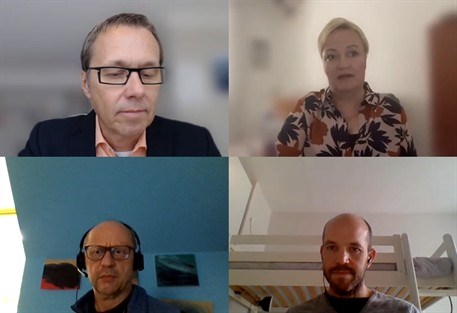The European Artic in EU post 2020 policies
On October 13, North Sweden organized a webinar with Elsi Katainen and Erik Bergkvist, Members of the European Parliament, together with OECD, the European Commission and Northern Sparsely Populated Areas (NSPA). The discussions focused on the NSPA's role for enabling a sustainable regional development in the European Arctic.
Together with Elsi Katainen (RE) and Erik Bergkvist (S&D), North Sweden arranged a roundtable discussion within the network of Northern Sparsely Populated Areas (NSPA), which represents the thirteen northernmost regions in Sweden, Finland and Norway. Invited speakers were Normunds Popens, Deputy Director-General of the Regional and Urban Policy, José Enrique Garciliazo, Head of the Regional and Rural Unit at the Organization for Economic Cooperation and Development (OECD), and Urmas Paet, Member of the European Parliament and Arctic Policy Rapporteur.
The discussions revolved about how local challenges can be transformed into global opportunities in relation to territorial dimensions of EU policy from 2020 onwards. The event was moderated by Mikael Janson, Director of North Sweden together with Jenna Huhtanen, Senior Adviser at the East-North Finland EU Office.
The European Green Deal - a top priority
Elsi Katainen started off by pointing out that climate and environmental issues are top priorities within the EU. The European Green Deal will have a major impact on all policy areas - from the agricultural sector to the mining industry - in the next budget period. The NSPA regions and the European Arctic have a crucial role to enable a sustainable green transition in line with objectives of the Green Deal. However, this potential in the NSPA regions must be understood in relation to their territorial challenges.
Sustainable and inclusive regional development
The territorial dimensions were something also José Enrique Garcilazo emphasized. Garcilazo, who has been involved in a previous OECD report on the NSPA regions, underlined that not only should sparsely populated areas be compensated with economic compensation, but rather be targeted with place-based policies that build on the unique assets each local community hold. Garcilazo also highlighted the importance of further broadband expansion in sparsely populated areas, since it is one of the most critical issues to enable sustainable regional development and decrease the digital gap between urban and rural areas.
Also Normunds Popens emphasized the need of investing in digital and green infrastructure in the European Arctic. Popens argued for a more diverse picture of rural areas and rural development. He therefor urged all participants to take part in the European Commission´s consultation on long-term vision for rural development. Moreover, with United Kingdom´s withdrawal from the EU, the funds for collaboration within the Interreg program of Northern Periphery and Arctic (where Scottland has been included) will decrease. It is crucial for the EU to secure further financial opportunities in order to promote future interregional collaboration in the northern parts of Europe.

Mikael Janson, Director at North Sweden, Elsi Katainen (RE), Member of the European Parliament, Normunds Popens, Deputy Director-General of the Regional and Urban Policy, José Enrique Garciliazo, Head of the Regional and Rural Unit at the Organization for Economic Cooperation and Development (OECD).
The geopolitical situation
The Artic region is an area of increased geopolitical tension with a growing number of actors striving to increase their military present on ground. This was touched upon by Urmas Paet, who received the question of what role the regional actors should play in order to safeguard a sustainable and inclusive development of the Artic. Paet replied that the EU is the most efficient tool for the Arctic regions to make an impact, whereby he especially urged for the ongoing consultation on the EU's new Artic strategy.
The role of the regions in the European Arctic
The NSPA has a crucial role to safeguard the regions' interest and the involvement of local actors in the Arctic. Regional representatives from Finland, Norway and Sweden highlighted challenges and opportunities from each country. Nils-Olov Lindfors, NSPA's chairman and regional councilor in Norrbotten, highlighted the NSPA's ability to contribute to a green transition within EU thanks to all the natural resources and high-technological industries in the region. Mika Riipi, Regional Councilor in Finnish Lapland, pointed out the ongoing trend in Finland with increased out-migration from urban to rural areas, not least in the Lappland region. Nils Christian Sørheim Nilsen, Director of the North Norway European Office, argued that the EU's involvement in the European Arctic is essential in order to enable a sustainable regional development.
Next steps
Erik Bergkvist summarized the discussion by emphasizing that climate change and geopolitical tensions both will be major challenges in the coming years. Therefore, the work of NSPA is highly important in order to strengthen interregional collaboration and sustainable regional development in the European Arctic. Bergkvist stressed the importance to secure EU funds for regional development in the next program period. There is a chance that the Just Transition Fund (JTF) can be used for further investments in broadband expansion and electrification of the transport sector in the NSPA regions.
Read more about the public consultation on EU Arctic Policy here.
Read more about the public consultation on Rural development here.
Read the OECD territorial review on NSPA here.
